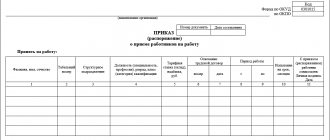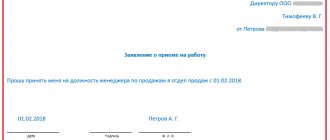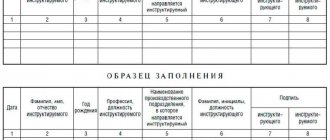Why is the questionnaire needed?
HR specialists widely practice the active recruitment method, when they attract as many applicants as possible for one position. In order to select a suitable employee from among them, applicants are asked to fill out a questionnaire. A questionnaire for an applicant when applying for a job will help the personnel officer analyze the personal and professional qualities of applicants, give them an overall assessment and select candidates for testing and interviews.
What questions does the civil service application form contain?
The official sample application form for a job candidate from the Government Order contains 23 points. This amount of information is enough to create a general description of the applicant. In addition to the formal fields about name, date of birth, place of residence, education, and detailed work experience, the form includes questions that allow you to assess the applicant’s trustworthiness and involvement in government affairs:
- about changing the surname;
- about citizenship and the reasons for its change, if it was different before;
- about promotions in civil, state or military service, when and by whom class rank was assigned, if any;
- about a criminal record;
- is there access to state secrets;
- about the availability of state awards and insignia;
- addresses, positions of close relatives, including former ones;
- about staying abroad, for what purpose, as well as about living abroad of close relatives, including former ones.
How to write questions correctly
The questionnaire should help the personnel officer get an idea of the candidate’s professional, business and personal characteristics, consider his suitability for performing job duties, ability to work in a team, and ability to take into account not only his own interests, but also general ones.
It is necessary to highlight the main criteria for each vacancy, which will be the basis of the requirements when selecting a candidate. Here is a model for effective employee selection, developed using modern methods.
How to write wishes for a future job: examples
The requirements presented must correspond to your status, specialty, and situation. You can’t mindlessly copy points from someone else’s resume.
Option #1. We start from the existing profession.
For related specialties, the wishes often coincide. So, a sales consultant and a sales manager can write the following in their resume: “Having a break, transparency in bonuses, on-the-job training.”
Option #2. Let's focus on the current situation.
If you have a small child, then as your wishes, indicate the proximity of the office to your home, a flexible schedule, or remote work. Also, immediately indicate that you are not ready for business trips.
Do you dream of building a career without leaving home? Read our article “Top 20 professions for remote work.”
Option #3. Let's start from the status.
For an experienced specialist, the prospect of career growth and the opportunity to solve complex but interesting problems are important. At first, newcomers need a mentor, professional training and quality feedback from management.
Try to take into account all of the above and, on this basis, make a short list of wishes for future work in your resume. It should reflect only the most important things. The rest can be discussed during the telephone interview or during the interview stage.
How to indicate preferences for a future job in a resume : 3 tips for aspiring professionals
- Make a list of what you can offer an employer.
Don't be categorical when assessing your skills. Lack of experience is not a reason to belittle your merits. Remember all your successes. Perhaps you helped your parents run their business, had a great internship, performed brilliantly at a conference, or won a project competition. - Analyze your business and personal qualities.
Listen to the opinions of friends and family. - Imagine .
Divide a sheet of paper into 2 parts. On the left, indicate which requirements for your future job are really important to you. On the right - what “sacrifices” are you willing to make for her.
Be careful!
In your pursuit of the perfect job, you risk missing out on a good offer.
Here's a clear example:
A graduate of a culinary college turned down an urgent vacancy as a cook in a prestigious restaurant. She motivated her decision as follows: “I don’t want to lose two hours every day on the road to the establishment and back.” The girl asked to find a job under the same conditions, but close to home. The recruiter spent a long time explaining to her that this position is a real chance to make a huge leap in her career and quickly “earn a name.” But the girl did not compromise her principles. In this case - in vain.
Education
Education information should include detailed information about educational institutions, graduation date, and qualifications awarded. Information about additional education and self-education of the candidate is important. For example, about knowledge of foreign languages: what and at what level. A question about computer literacy is also required.
Most organizations pay attention to the basic education of applicants and give preference to graduates of reputed higher education institutions, but skills and experience are also considered in parallel. Modern employers are happy to see specialists with three to five years of experience.
Where to write about job requirements in a resume
Desires for a job can be indicated in a resume in different ways. Whichever one you choose, when writing this information, keep in mind 3 main rules: concise, succinct and to the point
.
How to tell a recruiter about your preferences using a resume:
- In the "Additional information" block.
In this section, you can indicate not only the requirements for the place of work, but also other points that, in your opinion, may influence the employer’s decision. For example, professional and personal plans. - In the “Wishes for the place of work” block.
To focus the recruiter’s attention on your expectations, place the information in a separate section of your resume. - In the cover letter.
Write a short paragraph in which you describe in a few words your ideal working conditions.
On the Myresume website, information about the desired salary, work schedule, readiness for relocation and business trips is indicated in the “Additional information” block.
You can tell about something else either in the cover letter or in the “Additional” block. Info". In the latter case, you will need to edit the section title: make sure that the title reflects the essence (“Wishes for a new place of work”, “Wishes for a future job”, etc.)
Remember that work ambitions must be matched by experience and achievements. If you have just graduated from university and are taking your first steps in your career, you should not make too high demands.
Experience and skills
It is proposed to indicate previous places of work and job responsibilities in chronological order. Vocational questions about knowledge and skills cannot always be included in the general form. But it is convenient to add a question to your sample questionnaire for a job interview whether the applicant agrees to take a test for knowledge of the profession.
An employee may have a specialized education, but no experience, or vice versa - have suitable experience, but have a different education. It is necessary to correctly assess its potential capabilities. An applicant who has no experience, but has business qualities and energy, will begin to work more efficiently over time than an employee with more experience.
Sample filling
Each enterprise has its own questionnaire, but any organization has a standard list of questions. Among them:
- Full Name;
- Date and place of birth;
- citizenship;
- Contact details;
- passport information;
- education;
- attitude towards military duties (for men);
- work history;
- skills and abilities related to the profession;
- additional skills and abilities;
- marital status and additional information about the family;
- hobbies and interests.
These are the most basic questions, but sometimes employers require the applicant to attach additional documents confirming the absence of a criminal record or answers to additional questions, for example, the desired salary level, character traits, and so on.
More detailed questionnaires are offered when applying for a job in large networks, for example, Pyaterochka, Magnit, Sberbank and so on. These large networks usually have online questionnaires.
Material on the topic Autobiography - sample / example of writing (how to write an autobiography for work)
Health
It is believed that it is inappropriate to include a question about health in an applicant’s sample application form when applying for a job. In Russia, for example, discrimination based on disability is not allowed - Article 3.1 of the Federal Law No. 181 of November 24, 1995. But when it comes to professional selection for positions requiring great physical endurance, candidates are expected not only to have exceptional health, but also to have certain sports skills . The selection stages, for example, for firefighters and rescuers of the Ministry of Emergency Situations, include both a psychologist’s opinion and a medical examination. Physical health also determines the fate of candidates for many working professions, especially in heavy industry. Therefore, questions about health must be justified.
What to write in your resume about your wishes for a new job
Everyone dreams of finding the ideal job. In practice, this does not always work out. Therefore, before writing your resume, set your priorities. Take a blank sheet of paper and a pen. Set your expectations. Start with the most valuable items.
Here are examples of requirements for a new job that a candidate may put forward:
- High salary.
- Availability of a social package, compensation for food or travel and other non-material bonuses.
- Opportunity to undergo professional training at the expense of the organization.
- Official registration, “white” salary.
- Respect in the team.
- Career prospects.
- Social significance of the product (service) of the enterprise.
- Flexible schedule, remote or hybrid work format.
- Proximity of office to home.
- High-quality feedback from management.
- A recognizable brand, a positive reputation of the company in the market.
- Transparency of incentive payments.
- Opportunity to influence the development of the company.
- The presence or absence of business trips and internships.
- Developed corporate culture.
- Innovative work environment, modern office equipment.
- Caring for the health of employees.
- Interesting projects, tasks.
Requirements don't have to be a huge list. It is enough to indicate 3-4 points. Assess the situation soberly: you shouldn’t write everything that comes to mind.
As additional wishes for a new job, you can write in your resume about the amount of salary, the availability of specific software or equipment.
State your preferences if you categorically refuse to work under different conditions.
What not to ask
When recruiting personnel, two parties take an active part: the employer and the candidate for new employees. We must try to interest the future employee and leave a good impression of the organization. Questions about nationality, religion, marital status, and living conditions can interfere.
You should not include a question about the purpose of employment - it causes awkwardness and distrust in the personnel service. Highly qualified applicants know their worth and can evaluate the work of the personnel department, and based on it they get an idea about the entire team of the organization.
Little tricks when filling out
As it turned out, with the help of some psychological techniques you can learn a lot about a person.
Typically, the employer passes the completed questionnaire to certain specialists, who, in turn, analyze the applicant’s answers. Very often, certain situations are given and the candidate must describe how he would get out of it.
There are no definite answers to such questions; each situation is individual and everyone can get out of it in their own way. This allows employers and psychologists to get a complete picture when choosing a specific employee.








